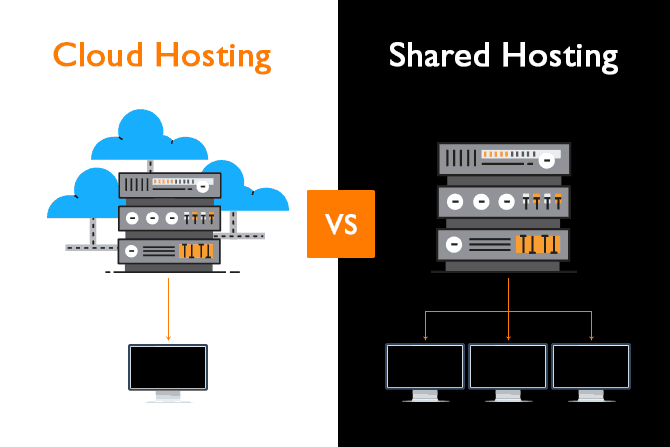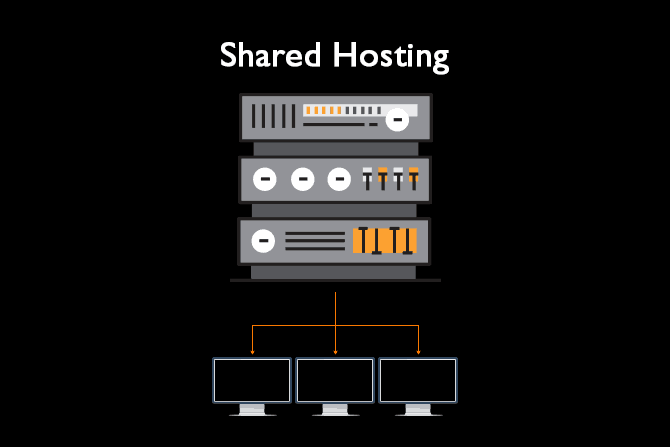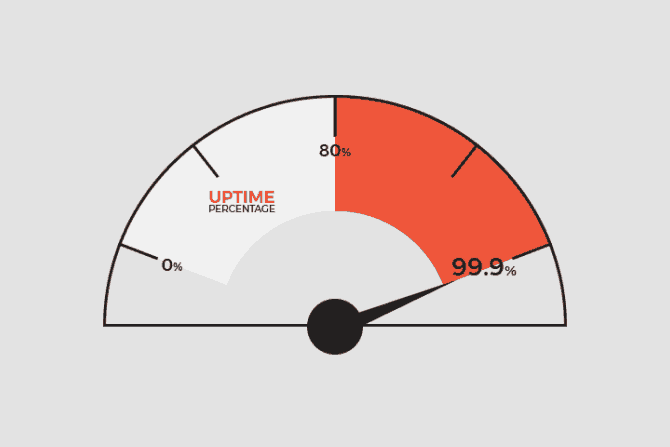Just creating a beautiful website layout is not enough, you also have to upload it online and this is where a web hosting service comes into the picture.
A Web Host links your website to the main server giving you the online space to setup your virtual identity. Most web hosting companies, like Bigrock, also offer domain registration functions, wherein you can register your preferred domain name , which is the name by which your website is known and recognizable to the audience.

Now, there are varied types of web hosting available. You can share the server space with other business, host your site on the Cloud or create a private virtual network for your blog. Shared website hosting has been a part of website development for a while now, while the Cloud web hosting tools have been introduced only recently sometime in 1996.
In this Cloud hosting vs Shared hosting article, we have listed the basic difference between Cloud hosting and Shared hosting, in terms of features, functions, and tools. So, let’s dive in and check out which is the best – Cloud hosting or Shared hosting!
A. What Is A Web Host and Why You Need It?
To put it simply, web hosting is a place where your website will sit on the internet. It gives your content the much-needed server space and virtual identity through which your customers can access your website.
When you design a website on the site builder, the content is visible only to you as it is saved on your personal computer. With a web host, you can upload this information online and share it with the world with just the click-of-a-button.

With a web host, you can create an engaging online identity and share all your content with your readers across the globe in a matter of minutes. Most web hosting companies also offer website building tools and domain registration services that cover all the essential web development tasks for you giving you ample time to concentrate on creating quality content.
Moreover, some web hosts also offer free Cloud computing facilities and free SEO tools that enhance the visibility and reach of your content.
Now, before we get started with the Shared hosting vs Cloud hosting comparison, let’s make sure we have a clear concept of what both these types of hosting mean.
Read more: Shared vs WordPress Hosting
B. What Is Shared Hosting?
Shared hosting is the most popular and widely used web hosting option that supports both growing enterprises as well as established businesses. Shared hosting is when you have to share the server space with other similar businesses online.
It usually offers the most basic of functions and is the cheapest option available. In a Shared hosting environment, you will have to share all the resources and tools with others in the group, it is more or less like having a room-mate.

Storage space, bandwidth, CPU usage, data and analytical tools everything is distributed among the various websites listed on the hosting network. You don’t need much technical expertise or special coding skills to work in a Shared hosting environment. The hassle-free framework is ideal for amateurs.
Shared hosting, though very affordable and user-friendly, does have its fair share of disadvantages. For instance, your website is more susceptible to online attacks. Even if one of the websites in the network is infected by malware, it can spread over to others. Also, as you are sharing the disk space and bandwidth with others your server uptime will dwindle considerably. You have no control over the server performance and uptime.
Bigrock offers one of the best and affordable Shared hosting services in India. Their Linux Shared hosting package starts ₹89/per month and the upper-level package is priced at ₹499/per month. You could also get a further discount by using these big rock coupon code.
Also, here are a few other hosting companies that offer affordable Shared hosting plans. To know how they compare to BigRock India, read the comparison guides below.
C. What is Cloud Hosting?
Cloud hosting is a recent addition to the list of hosting that was introduced in 1996. A completely different and path-breaking hosting platform, Cloud hosting is where you can “rent” out the server space and resources to businesses without any actual hardware. In the Cloud environment, everything is virtual.

Cloud hosting is basically a cluster of servers, all operated and accessed online that host websites together. Here, you can switch over from one host to another easily in case of technical issues or online threats. The Cloud computing technology is where many servers and machines are working synchronously to form one single entity.
The performance and productivity of the hosting service are directly proportional to the number of servers the host includes. Bigrock is an example of Cloud hosting that is known for its lightning fast server uptime, flexible framework, and affordable resources.
The pricing for Cloud hosting on Bigrock starts at ₹399/per month and you can avail massive discounts on this hosting by making use of these Bigrock Hosting Coupons.
Now, if you want to compare web hosting plans of other hosting providers before you make your final decision then here are a few comparison review articles that you can look into.
D. Cloud Hosting vs Shared Hosting – A Comparative Study
Both Cloud hosting and Web hosting perform the same function, i.e., give you the required space and identity to start a website online. However, the similarities end there. When it comes to features and functions, both the services are as different as chalk and cheese. So let’s take a look at the differences in this Cloud hosting vs Shared hosting comparative study.
1. Shared vs Cloud Hosting – Types of Hosting
With Shared hosting, you get the benefit of a small portion of a single server for a fixed price. If you need to manage only one or two websites at a go, the classic Shared hosting will be ideal for you.
However, when you manage multiple websites with a lot of traffic, you need to allocate computing resources via the internet which is what website Cloud hosting does, basically. Cloud hosting can be broadly divided into 3 categories – Platform as a Service, Software as a Service and Infrastructure as a Service i.e. PaaS, SaaS, and IaaS.
2. Cloud vs Shared Hosting – Hosting Framework
As we already learnt, the traditional web hosting framework can be divided into three types – Shared hosting, VPS hosting and Dedicated Servers. In Shared hosting, there are a number of websites sharing the same resources. In VPS, the user gets greater control over the website, though he still has to share the features. Dedicated hosting is when the web server is yours to use. Cloud hosting is completely different as there are a number of web servers shared by a number of websites. Use BigRock hosting coupons to purchase web hosting at a discount!
3. Cloud Hosting vs Shared Hosting – Server Uptime
Shared hosting packages offer a lower server uptime when compared to the Cloud computing services. Here, users have to stick to their web hosts no matter the amount of traffic or any other technical glitch.

On the Cloud, you can switch over to another host, thus reducing the downtime and boosting the page’s reach and performance. Bigrock, for instance, offers 99.99% server uptime and is incredibly fast.
4. Cloud vs Shared Hosting – Bandwidth and Disk Space
In Shared web hosting services, the resources are shared and hence, have to be distributed among the various websites. Also as the disk space and bandwidth is limited, there is always a shortage of storage. Cloud hosting offers unlimited storage space and bandwidth range, there’s always enough space for everyone. You can host multiple websites under different email accounts and manage them all in one place on the Cloud.
5. Shared vs Cloud Hosting – Customer and Technical Support

The Shared hosting plans offer very less technical support when compared to Cloud hosting. In Cloud based web hosting, there are a number of hosts and hence a wider tech-support community that can be reached via chat, phone or video calls.
6. Shared Hosting vs Cloud Hosting – Performance
Cloud hosting environment is more competent and compatible with other platforms and devices. You can use the services on your laptops, sync it to the smartphones or even link your social media accounts. Also, as there are many hosts, users get the freedom to jump from one service to another in case of heavy traffic. Shared hosting offers no such benefits.
7. Cloud Hosting vs Shared Hosting Review – Speed
Website page speed is a ranking factor. As such, it is one of the most important features that you need to look into when purchasing a web hosting.
Users have often complained about the server crashes and slow uptime in a Shared hosting environment. As the disk space and server is shared by many websites together, it obviously reduces the productivity and hampers the speed of the websites. In Cloud hosting, you will face no such trouble as there are a number of hosts together in a network to share the load for greater efficiency.
8. Shared Hosting vs Cloud Hosting Compared – Pricing
Standard Shared web hosting services are a lot cheaper than those available on the Cloud. This is because in Shared hosting services the resources are shared by other websites, thereby cutting on costs and reducing the overall web development pricing. Now, in Cloud hosting, a single website can access the services of different hosts and gets more flexibility and customization opportunities. This would obviously cost more.
9. Cloud Hosting vs Shared Hosting – Security
Shared hosting is not at all safe. Your website is under constant threat of an online attack, data hacking or malware infestation. As all the resources are shared by different websites, there is also the threat of reduced performance and unauthorized access to your personal files.

In Cloud hosting services, you don’t have to worry about any such thing. The website security it offers protects your site with a firewall and has SSL certificates integrated that encrypt all the files.
10. Cloud vs Shared Hosting – Features and Functions
Cloud hosting plans offer a lot more features and tools when compared to the traditional Shared web hosting services. In Cloud hosting, you get SEO improvement tools, CMS solutions, eCommerce tools, website building features and also many social media integration functions that allow you to link the website to other platforms as well. In standard Shared hosting, however, users get only the basic functions. For everything else, they have to pay.
11. Shared Hosting vs Cloud Hosting Review – Controls
In Shared hosting, the user doesn’t have much control over the resources and the functionalities of the website. Shared hosting plans offer no flexibility and freedom as the server performance is dependent on how everyone else on the network uses the host. In Cloud hosting, you can switch over from one host to another in case you notice a problem.
Further reading: Difference Between Cloud Hosting vs VPS Hosting
Conclusion - Is Cloud Hosting better than Shared Hosting
When it comes to a war between Cloud hosting vs Shared hosting, the Cloud is always the best choice. Shared hosting, though cheaper, involves a lot of risks. Cloud hosting is definitely a smarter choice for growing businesses and start-ups.
BigRock is a great web hosting solution that offers the best of performance and controls. Here, users can access both Shared and Cloud hosting packages, depending on the hosting plan they choose. For those sceptical as to why they should choose Bigrock, here is an honest Bigrock review that you can check out. Plus, in addition to coupons for web hosting, Bigrock also offers Bigrock Domain coupons making it affordable to register a domain at an economical rate.






Leave a Reply